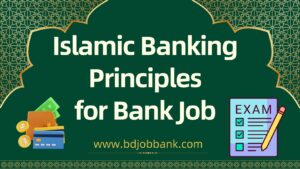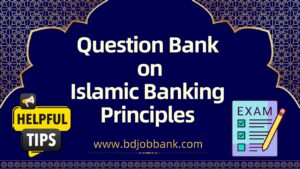Islamic Banking Exam Questions for Bank Jobs in Bangladesh
Shariah-Based Islamic Banking MCQ & Study Guide for Bank Job Exams in Bangladesh
Islamic banking is getting popular in Bangladesh, especially for those looking for bank jobs. Unlike conventional banks, Islamic banks follow Shariah law, meaning they don’t deal with interest (riba). Instead, they focus on ethical finance, profit-sharing, and fair transactions.
Islamic banking operates under the principles of Shariah (Islamic law) and focuses on ethical and interest-free financial transactions. It has gained popularity in Bangladesh due to its compliance with Islamic principles and fair profit-sharing mechanisms. Below is a detailed breakdown of key topics related to Islamic banking.
If you’re preparing for a bank job exam, knowing Islamic banking concepts is a must. This post includes important MCQs on Islamic banking principles, contracts, regulations, and services. These questions will help you understand how Islamic banks work and improve your chances in the exam. Let’s get started!
Disclaimer:
The information in this post is collected from various sources. While we strive for accuracy, we cannot guarantee that all answers are 100% correct. If any question or answer is incorrect based on official guidelines or sources, we are not liable for any consequences. Please verify with authentic references before relying on the information.
1. Basic Principles of Islamic Banking
Islamic banking is fundamentally different from conventional banking because it does not allow interest (riba). Instead, it follows profit-sharing, risk-sharing, and ethical investments. Here are the core principles:
- Prohibition of Riba (Interest): Islamic banks cannot charge or pay interest, as it is considered exploitative. Instead, they earn profit through trade, leasing, or partnerships.
- Asset-Backed Transactions: Every financial transaction must be backed by tangible assets or services to avoid speculation (Gharar).
- Profit and Loss Sharing (PLS): Both the bank and customers share profits and risks instead of earning fixed interest.
- Ethical and Halal Investments: Islamic banks do not invest in businesses related to alcohol, gambling, pork, or unethical activities.
These principles ensure fairness and transparency in financial dealings and align with Islamic teachings.
Below are some MCQs for practice, designed to help you prepare for bank exams in Bangladesh.
1. What is the key difference between Islamic banking and conventional banking?
a) Islamic banks charge higher interest rates
b) Islamic banks do not operate internationally
c) Islamic banks do not deal with interest (riba)
d) Islamic banks are only for Muslims
Answer: c) Islamic banks do not deal with interest (riba)
2. What does ‘Riba’ mean in Islamic finance?
a) Profit from investments
b) Excess or usury (interest)
c) Trade with non-Muslims
d) Loss in business
Answer: b) Excess or usury (interest)
3. Which of the following is a common mode of Islamic finance?
a) Murabaha
b) Forward contracts
c) Derivatives
d) Fixed deposits
Answer: a) Murabaha
2. Islamic Banking Contracts and Modes of Finance
Islamic banks use special financing methods to comply with Shariah. The most common contracts include:
- Murabaha (Cost-Plus Financing): The bank buys an asset and sells it to the customer at a profit, with clear terms and no hidden charges.
- Mudaraba (Profit-Sharing Partnership): One party provides capital, and the other manages the business. Profits are shared based on an agreed ratio, while losses are borne only by the investor.
- Musharakah (Joint Venture Investment): Both the bank and the client invest capital in a business and share profits and losses.
- Ijarah (Islamic Leasing): The bank buys an asset and leases it to the customer for a fixed period. Ownership remains with the bank.
- Takaful (Islamic Insurance): A cooperative system where participants contribute money to cover potential risks, following the principles of mutual assistance.
These modes of finance replace traditional loans and ensure that all transactions comply with Islamic ethics.
The following MCQs are provided for practice, focusing on bank exam preparation in Bangladesh.
4. What is Mudaraba in Islamic banking?
a) A contract where both parties invest equal capital
b) A partnership where one party provides capital and another manages it
c) A fixed deposit system
d) A loan with interest
Answer: b) A partnership where one party provides capital and another manages it
5. What does Musharakah mean in Islamic banking?
a) A profit-sharing partnership where both parties invest capital
b) A leasing agreement
c) A form of Islamic insurance
d) A type of loan with flexible interest
Answer: a) A profit-sharing partnership where both parties invest capital
6. In Murabaha, the bank:
a) Invests in the stock market
b) Buys goods and sells them to the customer with a profit margin
c) Lends money to businesses at low interest
d) Accepts deposits and gives interest
Answer: b) Buys goods and sells them to the customer with a profit margin
7. What is Ijarah in Islamic finance?
a) A leasing agreement where the bank owns the asset
b) A donation-based financing model
c) A type of investment banking
d) A foreign exchange transaction
Answer: a) A leasing agreement where the bank owns the asset
3. Regulatory Framework and Compliance
Islamic banking in Bangladesh is regulated by Bangladesh Bank, which ensures that all financial activities align with Shariah law. Each bank must also have a Shariah Supervisory Board (SSB), consisting of Islamic scholars and finance experts who:
- Review financial products to ensure compliance with Islamic principles.
- Monitor transactions and investments to prevent interest-based activities.
- Provide guidance on ethical financial practices.
Bangladesh Bank has also issued Islamic banking guidelines to maintain industry standards and prevent malpractice.
Practice these MCQs to improve your understanding of Islamic banking for bank job exams in Bangladesh.
8. Which organization regulates Islamic banking in Bangladesh?
a) Islamic Development Bank (IDB)
b) Bangladesh Securities and Exchange Commission (BSEC)
c) Bangladesh Bank
d) Ministry of Finance
Answer: c) Bangladesh Bank
9. What is the role of a Shariah Supervisory Board (SSB) in an Islamic bank?
a) Managing customer complaints
b) Ensuring all financial activities comply with Shariah
c) Auditing financial performance
d) Approving loan applications
Answer: b) Ensuring all financial activities comply with Shariah
4. Islamic Banking in Bangladesh
Islamic banking has grown significantly in Bangladesh due to rising demand from Muslim customers. The first Islamic bank in the country was:
- Islami Bank Bangladesh Limited (IBBL) – Established in 1983, it remains the largest Islamic bank in Bangladesh.
Other prominent Islamic banks example:
- EXIM Bank
- Al-Arafah Islami Bank
- First Security Islami Bank
Additionally, some conventional banks offer Islamic banking divisions, such as:
- Prime Bank
- Standard Chartered Bangladesh
The rapid expansion of Islamic banking highlights its importance and growing customer trust in Bangladesh.
We’ve compiled some practice MCQs to assist you in preparing for bank job exams in Bangladesh.
10. Which was the first Islamic bank in Bangladesh?
a) Islami Bank Bangladesh Limited (IBBL)
b) EXIM Bank
c) Al-Arafah Islami Bank
d) First Security Islami Bank
Answer: a) Islami Bank Bangladesh Limited (IBBL)
11. Which of the following conventional banks in Bangladesh has an Islamic banking division?
a) Sonali Bank
b) BRAC Bank
c) Prime Bank
d) Eastern Bank
Answer: ____
12. What is the main challenge faced by Islamic banks in Bangladesh?
a) Lack of customer interest
b) Shortage of Shariah-compliant investment opportunities
c) High transaction costs
d) Limited number of branches
Answer: b) Shortage of Shariah-compliant investment opportunities
5. Islamic Banking Products and Services
Islamic banks offer a variety of Shariah-compliant financial products, including:
- Mudaraba Savings Accounts – Profit-sharing accounts where depositors earn a share of the bank’s profits instead of interest.
- Wadiah Current Accounts – Safe-keeping accounts where funds are kept securely without earning interest.
- Ijarah (Leasing) – Used for financing cars, homes, and equipment through Islamic leasing models.
- Murabaha (Trade Financing) – Helps businesses purchase goods with an agreed profit margin instead of interest-based loans.
- Takaful (Islamic Insurance) – An alternative to conventional insurance, operating on a mutual assistance model.
These services provide customers with ethical, fair, and risk-sharing financial options.
Below are some important MCQs to test your knowledge for upcoming bank exams in Bangladesh.
13. Which of the following is an Islamic savings account based on profit-sharing?
a) Wadiah
b) Mudaraba Savings Account
c) Current Account
d) Fixed Deposit Account
Answer: b) Mudaraba Savings Account
14. Which Islamic financing method is closest to a conventional lease?
a) Murabaha
b) Musharakah
c) Ijarah
d) Takaful
Answer: c) Ijarah
15. What is Takaful in Islamic finance?
a) A form of Islamic insurance based on mutual cooperation
b) A type of Islamic loan
c) An investment in stock markets
d) A fixed interest-based deposit
Answer: a) A form of Islamic insurance based on mutual cooperation
Islamic banking is growing rapidly in Bangladesh, offering ethical and interest-free financial solutions. With strong regulatory oversight from Bangladesh Bank and increasing customer awareness, it continues to expand.
For those preparing for bank job exams, understanding Islamic banking principles, contracts, and regulatory guidelines is essential. Staying updated with Bangladesh Bank’s Islamic banking policies will provide a competitive edge in job preparation.

